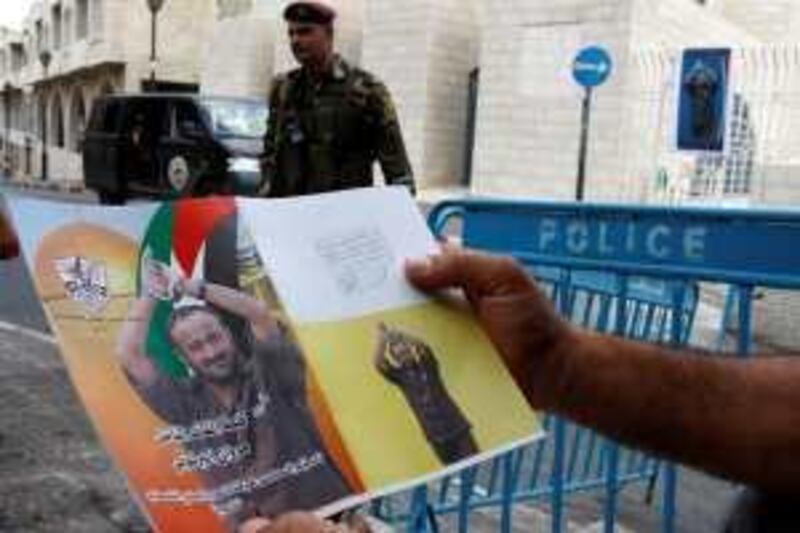JERUSALEM // Fatah's long-delayed and much-extended Sixth General Conference finally drew to a close yesterday, nearly a week behind schedule and with elections throwing up a few surprises and a new leadership.
The movement's ruling Central Committee has been almost completely overhauled, with only four incumbents retaining their seats in addition to Mahmoud Abbas, the Fatah leader, who was reinstalled as chairman unopposed. Two notable casualties of the poll were Ahmed Qureia, the chief Palestinian negotiator with Israel, a former prime minister and a long-time Fatah stalwart, and Tayeb Abdel Rahim, the head of the Palestinian Authority's presidential office. Both failed by less than a handful of votes to retain their seats on the expanded 23-member committee.
Among the 14 new, younger faces on the committee are Marwan Barghouti, a popular imprisoned West Bank leader, and Mohammad Dahlan, the former Gaza-security chief and a figure much reviled by Hamas. Also elected to the Central Committee were Nasser al Qidwa, the nephew of the former leader Yasser Arafat, and Jibril Rajoub, a former West Bank security chief. Abu Maher Ghneim, one of Fatah's principal leaders in exile and a long-time opponent of the Oslo process who was only persuaded at the last moment to attend the conference in Bethlehem, garnered the most votes.
Saeb Erekat, Tawfiq Tirawi and Hakam Balawi were some of the other notable new faces voted on to the committee. There are still four empty seats on the committee that will be filled by agreement among its new members. It is possible that either or both Mr Qureia and Mr Abdel Rahim will be nominated; however with no women or Christians elected to the committee, two seats may already be earmarked. In addition, the new-look Central Committee may also feel that Gaza deserves another representative, leaving only one seat empty.
For all the new faces, however, and all the sounds of fury at a conference that was supposed to have ended last Thursday, little political change is expected from the new leadership. The conference had already reached consensus on a political programme vis-à-vis Israel that broadly supports Mr Abbas's line of continued negotiations. And while some of the new members of the Central Committee take a very belligerent line on Hamas and Gaza, there is little chance of any practical change in policy, with Fatah in Gaza unable to pose any direct challenge to Hamas rule.
"There is no new thinking," said George Giacaman, a Palestinian analyst. "In terms of political positions on Israel and Hamas there will be very little change, and in terms of corruption, the problem that has beset Fatah for long and undermined much of its public support, some of the new faces on the Central Committee are themselves tainted with suspicion of corruption." Mr Giacaman said the only change that might be felt is within the movement itself, where long awaited reforms have yet to materialise and where there is plenty of scope for improvement. However, he said, the ability of those who want to reform the movement to effect any change would depend on the dynamics within the new Central Committee.
Mkhaimar Abusada, a Gaza-based analyst, said the new leadership would not be warmly welcomed by Hamas in Gaza, mostly because of the presence of Mr Dahlan, who led a crackdown on the Islamist movement in the 1990s and is a much-hated figure in Hamas circles. A few other new faces on the Central Committee, including Mr Tirawi and Mr Balawi, have also expressed a hard-line attitude toward their Islamist rivals.
Nevertheless, said Mr Abusada, it is not clear what effective difference the new leadership can make in terms of Gaza. "The new leaders may take a tougher position, but their options are limited. They have no military option, so in the absence of [unity] talks, the division between Hamas and Fatah will only deepen." The one person that appears to have come out of the conference strengthened is, as expected, Mr Abbas. For the first time since he assumed the leadership of Fatah, as well as the chair of the Palestine Liberation Organisation and the presidency of the Palestinian Authority, all after the death of Arafat, he can claim to have emerged from the shadow of his predecessor.
"Abbas has emerged as the strong man of Fatah," said Mr Giacaman. "He has been very much strengthened." The very convening of the conference was a "personal victory" for Mr Abbas, said Mr Abusada, who said he had shown himself to be a "very shrewd political operator, at least inside Fatah". In the long run, it is doubtful how significant the conference will prove to be. Fatah's evolution was arrested when it entered into the Oslo Accords only to find that the statehood that was meant to be the outcome of that process never arrived. Caught between being a liberation movement and a political party engaged in state building, the movement has never been able to clearly develop a working identity.
"The future will be decided by the political process [with Israel]," said Mr Giacaman. "If there will be a state, then Fatah can continue developing into a political party. If not, then it will have no choice but to return to its roots as a resistance movement." okarmi@thenational.ae






